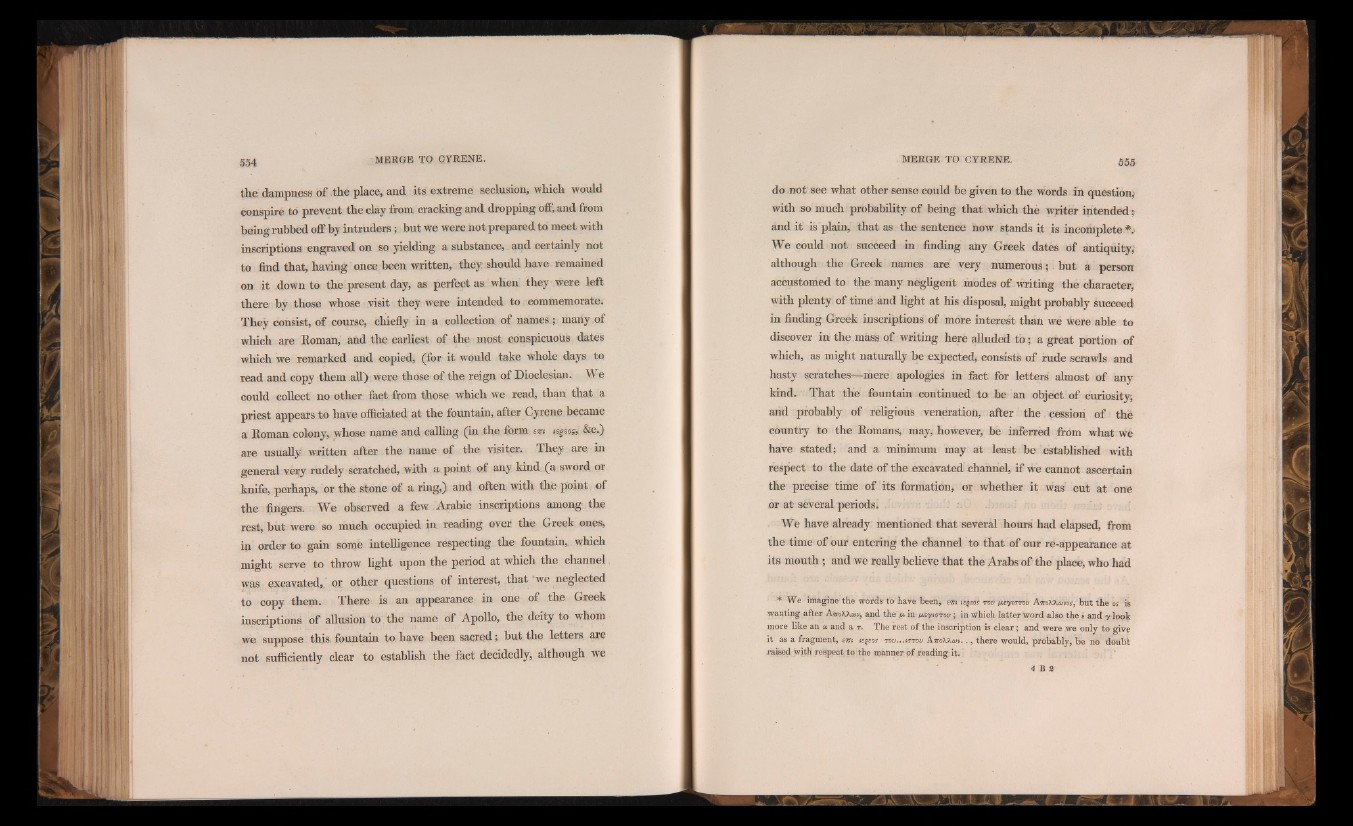
the dampness of the place, and its extreme seclusion, which would
conspire to prevent the clay from cracking and dropping off, and from
being rubbed off by intruders; but we were not prepared to meet with
inscriptions engraved on so yielding a suhstance, and certainly not
to find that, having once been written, they should have remained
on it down to the present day, as perfect as when they were left
there hy those whose visit they were intended to commemorate.
They consist, of course, chiefly in a collection of names.; many of
which are Roman, and the earliest of the most conspicuous , dates
which we remarked and copied, (for it would take whole days to
read and copy them all) were those of the reign of Diodesian. We
could collect no other fact from those which we read, than that a
priest appears to have officiated at the fountain, after Cyrene. became
a Roman colony, whose name and calling (in the form s« n$eoS, &o.)
are usually written after the name of the visiter. They are, in
general very rudely scratched, with a point of any kind (a sword or
knife, perhaps, or the stone of a ring,), and often with the point of
the fingers. We observed a few Arabic inscriptions among the
rest, but were so much occupied in reading over the Greek ones,
in order to gain some intelligence respecting the fountain, which
might serve to throw fight upon the period at which the channel
was excavated, or other questions of interest, that we neglected
to copy them. There is an appearance in one of the Greek
inscriptions of allusion to the name of Apollo, the deity to whom
we suppose this fountain to have been sacred; but the letters are
not sufficiently clear to establish the fact decidedly, although we
do not see what other sense could be given to the words in question;
with so much probability of being that which the writer intended;
and it is plain, that as the sentence now stands it is incomplete *>
We could not succeed in finding any Greek dates of antiquity,'
although the Greek names are very numerous;. but a person
accustomed to the many negligent modes of writing the character;
with plenty of time and fight at his disposal, might probably succeed
in finding Greek inscriptions of more interest than we were able to
discover in the mass of writing here alluded to ; a great portion of
which, as might naturally be expected, consists of rude scrawls and
hasty scratches—mere apologies in fact for letters almost of any
kind. That the fountain continued to be an object of curiosity;
and probably of religious veneration, after the cession of the
country to the Romans, may, however, be inferred from what we
have stated; and a minimum may at least be established with
respect to the date of the excavated channel, if we cannot ascertain
the precise time of its formation, or whether it was cut at one
or at several periods.
We have already mentioned that several hours had elapsed, from
the time of our entering the channel to that of our re-appearance at
its mouth ; and we really believe that the Arabs of the place, who had
' We imagine the Words to have been, siti icgeor too psr/itrcov AwoXtuuvor, but the or is
wanting after AiroXka/v, and the p in; peyiorou ; in which latter word also the e and y look
more like an a and a r. The rest of the inscription is clear; and were .we only to give
it as a fragment, rni isqeos rov...iorov ATtoXhw. . , there would, probably, be no doubt
raised with’ respect to the manner o f reading it.